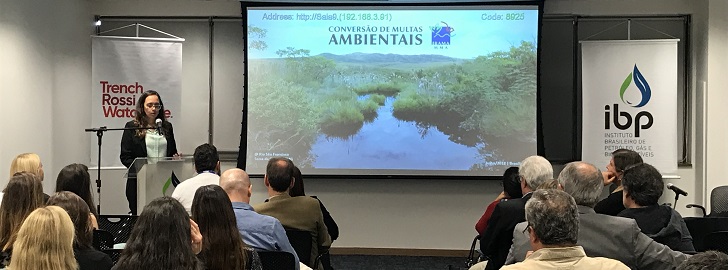IBP reunited sector agents to explain environmental fines conversion program

In order to minimize questions from oil and gas companies about the new set of rules from the IBAMA Environmental Fines Conversion Program, the Brazilian Petroleum, Gas and Biofuels Institute (IBP), in partnership with Trench Rossi and Watanabe law office, organized a special panel with sector members to discuss the normative instruction. According to Ana Beatriz de Oliveira, IBAMA Head of Fundraising and Special Projects Division (DCPE), the agency applies 3.5 million fines in all country, with a collection rate of about 5%. Nowadays, the IBAMA liability for fines is more than R$ 30 billion, with R$ 4.6 billion susceptible to conversion into services of preservation, improvement, and recovery of environment quality.
The proposed strategy now provokes the government agency to elaborate a national program, which will be reviewed every two year, informing priority themes and territories for the country. The idea is concentrate projects in the preferential areas to avoid a large number of smaller projects scattered throughout Brazil”, said Ana Beatriz. “The first publication for the IBAMA Environmental Fines Conversion Program has a perspective of implementing R$ 2.8 billion for the recovery of a thousand hectares of area”, added.
The Brazil’s commitment to restoring and reforesting 12 million hectares of forest, signed at the 21st Convention on Climate Change, in Paris, also the adaptation to climate changes and environment and water recovery of areas under critical conditions, are expected impacts of the program. In the first publication, for example, projects for water recovery of the São Francisco River Basin are planned, with 195 municipality’s coverage, and for adaptation to climate change and sustainable coexistence with the semiarid in the Parnaíba River Basin, which covers 213 municipalities.
“One of the biggest advantages of IBAMA Environmental Fines Conversion Program is, to avoid inappropriate purpose rather than the recovery and preservation of the environment“, declared Carlos Henrique Abreu Mendes, IBP SMS and operations executive manager.
Direct x indirect conversion
Other topic highlighted in the event was the difference between direct and indirect conversion, which extends the responsibility to the interested party. “Whatever were the choose procedure – direct or indirect -, the conversion implies in converting fines into services of environment recovery”, explained Halisson Barreto, IBAMA collection processes, environmental sanction and tax coordinator.
In the case of direct conversion, procedure already provided in previous legislations, the interested party will assume the project implementation, through its own means. However, with this new Normative Instruction, the projects must be applied in accordance with the guidelines, parameters, and priorities established in the IBAMA National Fines Conversion Program (PNCMI) and the IBAMA State Fines Conversion Program (PECMI), with state policies in application stage. In this scenario, the offender has 35% of discount.
On the other hand, indirect conversion has 60% of discount, and the project and its owner will be previously selected by IBAMA under the terms of the normative instruction, PNCMI and PECMI. The company is an intervener that can request the substitution of the applicant, which means the company will assume the costs and will conduct results analysis.
To Margareth Bilhalva, Petrobras environment lawyer, the indirect conversion is more interesting to companies that don’t have environment recovery as core business.
“It’s too important differentiate administrative to civil responsibility. Fine is a sum of money imposed as a penalty to prevent recurrence. So, cannot be use to recover the damage caused by the offender. The recovery of environment quality does not constitute a subjective right of the offender,” clarified Margareth.
“The initiate is aligned with company’s purpose to undertake issues with environmental agencies. Furthermore, the opportunity to invest money in projects that will benefit the environment is attractive to private organizations. In our understanding, it should also be analyzed as a chance to attenuate pending judgment processes, through IBAMA’s recognition of important aspects of arguments already submitted by companies, such as the occurrence of a limitation period”, added Renata Amaral, Trench Rossi Watanabe lawyer.
For those who are interested to join the Environmental Fines Conversion Program, the requirement can be request until the end of judgment at first instance, at final claims phase. According to transition rule, however, those fined until February 15th 2018 have a 180-day deadline to apply for the conversion of their fines, even if the final claims phase has already been exceeded.